The last few weeks in Scotland have seen some terrible weather resulting in floods, damage to homes and businesses and sadly the loss of life. My thoughts are with all those concerned. Living as we do off the North Atlantic such weather is not unusual – irrespective of whether it comes from the east or the west!! Global warming is making this kind of weather event more frequent, and we are told that the future will see such severe weather events increase.
Poor weather was something that our ancestors also experienced, especially when they lived, as many of mine did, in remote rural parts of countries such as Scotland. Today we have better equipment to deal with problems and enhanced transport and communication links to warn and inform. These undoubtedly will have helped in Angus and Kincardineshire to reduce the extent of loss, especially in lives. But websites such as the British Newspaper Archive, contain many examples of when our ancestors fell foul to the vagaries of the climate.
Looking back to the 19th century I find one example from my own family. A combination of illness, weather, transport and communication led to the sad and tragic loss of my 4 x great-grandfather Robert Reid. He was unfortunate enough to become an early victim of what was then the solution to long-distance travel, combined with poor weather in rural Scotland.
Robert Reid was born in 1813 in the parish of Drumblade in the North-West of Aberdeenshire. He was the youngest of seven children of George Reid, a crofter and his wife Margaret Pope. Six of the seven children were boys and George and Margaret lived on and worked a croft at Weistern in Drumblade.
Robert would have left home in his early teens which was the norm at the time. It seems he ended up several miles east in the parish of Fyvie, famous for its Castle and it Bonnie Lass!! In the adjacent parish of Daviot was raised Elspet Taylor, born in 1816 to her crofter father James and mother Christian Troup. Robert and Elspet met and were married in Daviot in January 1839 just in time for the birth of a daughter Barbara.
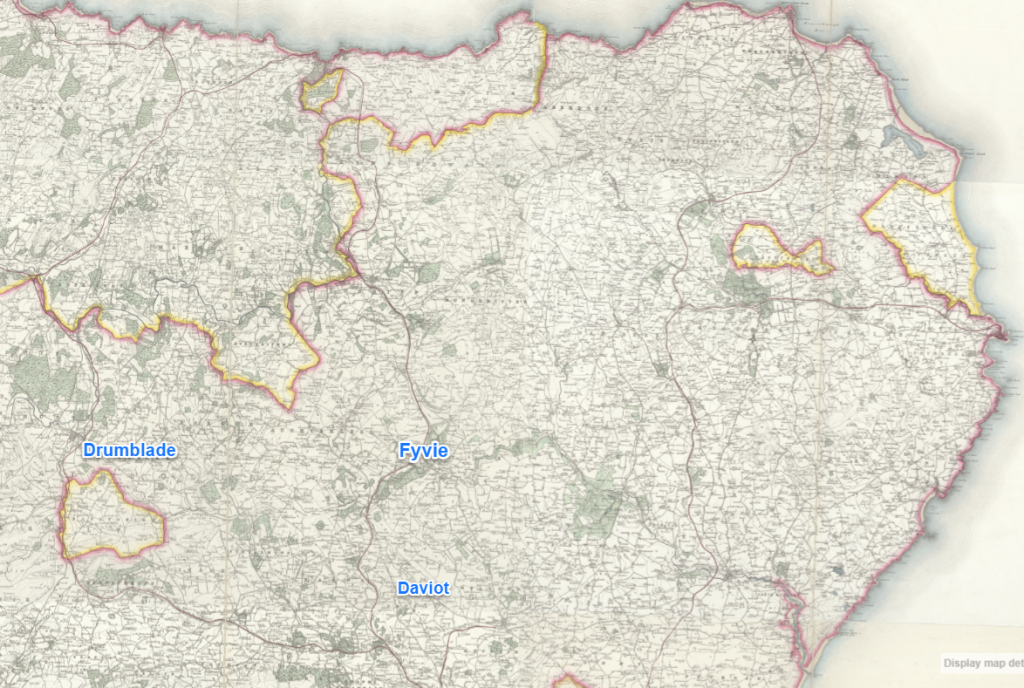
Macpherson’s improved map of Aberdeen, Banff and Deeside, &c. … – National Library of Scotland
The family moved to Burnside of Meadaple in the parish of Fyvie. This would be the family home until the death of Elspeth in 1878. In Aberdeenshire in this period it was unusual for a family to stay in the same place for such a long time, especially as they were never tenants at the farm. The 1841 Census finds Robert listed as 27 years of age. Another daughter, Ann joined the family in early 1841.
Burnside of Meadaple is located to the west of the village of Fyvie. A quick look at an OS map from the time shows that it is one of the numerous settlements clustered around the main road running to Turriff from Aberdeen. Today it is known to many travellers as the B9001. Burnside of Meadaple can still be found on the map but at the time it comprised several small crofts and settlements. In the 1851 Census, there were eight households including the Reids.
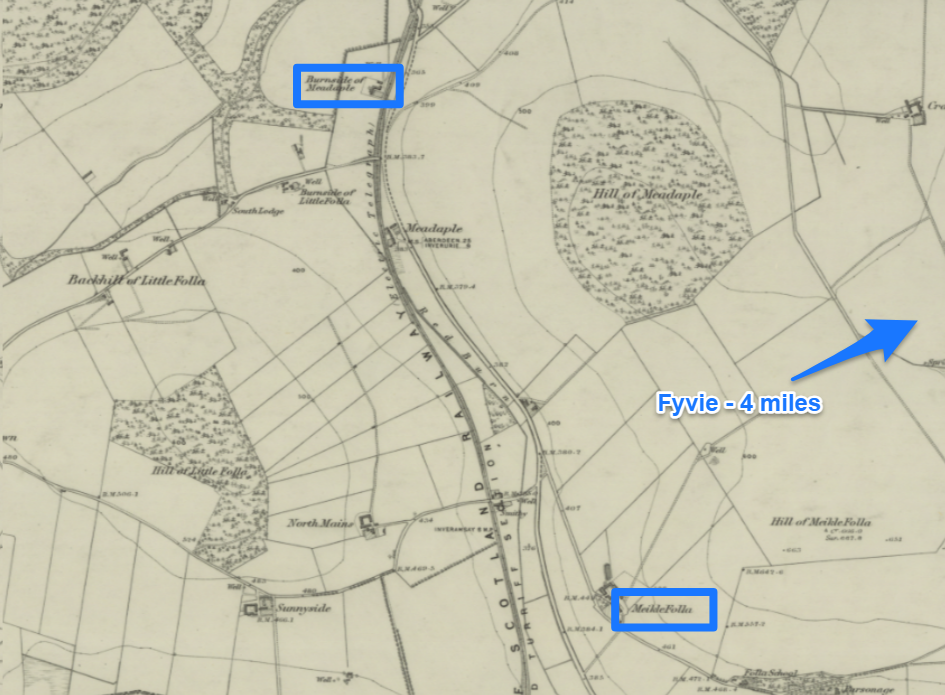
OS Maps, Six-inch, 1st Edition, Scotland, England & Wales, 1840s – 1880s
Robert Reid established himself as a stone dyker. Anyone travelling around the North-East of Scotland will encounter and appreciate the undoubted skill and mathematical capabilities of the dry stone dyker. They could fit together locally sourced stones to construct a solid, waterproof wall. Such structures were able to keep livestock in place and define farm or croft boundaries without the use of cement or other fixing materials. You can imagine that someone who was able to turn their hand to this skill would be valuable to the small farming and crofting community around Meadaple. Robert’s work would have been tough with the ability to work in all weathers irrespective of heat, wet or cold. I picture Robert as a solid-built man. A good back and solid muscles would have been a necessity for a dyker.
By March 1846 the Reid family comprised three young children – Barbara, now seven, Ann (my 3x great grandmother), aged three years and Elspet who was only a few months short of her second birthday. The family were facing the arrival of a fourth child later that year with Elspet now six months pregnant and perhaps beginning to show.
Living at Meadaple would have been tough for the children, devoid of the luxuries we take for granted today. However, the resilience of children can never be doubted and their lives in Meadaple would likely have had some joys. One attraction would have been the road to and from Turriff which ran passed their home. Occasionally these would have included the noise of multiple horses pulling the daily coach, The Defiance on its regular run between Inverness and Aberdeen.
A few months later an article would be published in the Aberdeen Herald. It praised the service provided by the Defiance which had by this time been running for 17 years. It began serving the 115 miles between Edinburgh and Aberdeen. However, demand had led to other branches being introduced. These included a branch to Glasgow from Edinburgh and a branch which continued the route of the Aberdeen coach the 100 miles “or more” to Inverness. By 1846 the coaches were beginning to face up to the challenge of the developing railway network. Many of the lines we know today were still to be built and this included the Banff, Turriff and MacDuff Junction Railway that would run along the glen and pass Meadaple. This would not open until the late 1850s.
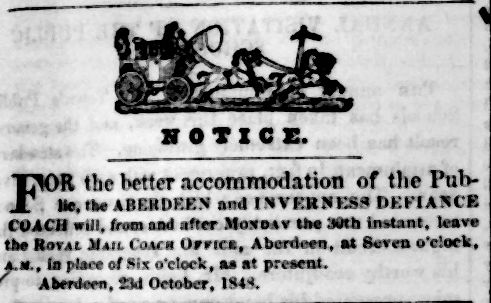
Aberdeen Herald – 28 October 1848 – p1a – British Newspaper Archive – www.findmypast.co.uk
On Saturday 20 March, the people of Burnside of Meadaple awoke to a frosty morning with the ground covered in snow. The following week the Aberdeen Herald reported that as the day progressed it became very stormy with snow reported to be lying at least three inches deep, perhaps more in inland areas such as Fyvie.
For Robert and Elspeth Reid, the inclement weather was the least of their problems. Later newspaper reports stated that the Reid children had come down with measles. In the 1840s, measles was a danger to young children and could decimate a family in little time. Faced with such a risk to his children Robert decided to do what any parent would do. He would need to go to the nearest doctor to seek medicine to help his children fight the measles infection. The newspaper reported that he had walked some four miles which is the distance from Meadaple to Fyvie so it is presumed he walked in the driving snow and sleat to Fyvie to procure the medicine for his three young girls.
He then made his way back towards Meadaple. Today walking on any road in blizzard conditions would be considered dangerous, especially with the diminishing winter driving skills of many people. But Robert would have been thinking little of the danger from traffic on the road. The only regular users on this road would be the odd rider travelling on a horse or cart. Most would be sheltering from the weather before the warm fire of their home or a nearby Inn or hostel.
The circumstances of exactly what happened to Robert are not clear. Did Robert stumble? or was he beginning to suffer the effects of the cold? Perhaps he had lain down for a rest, a fatal error made by many people suffering from hypothermia. We know that he was almost home as his headstone gives the location of the incident as Meikle Folla just a short distance from Meadaple. The Nairnshire Mirror report stated he was at a place called Maidendarroch which could not be found on any maps.
Visibility on the road was very poor. One newspaper described the weather as “the drift blowing very strongly at the time so that nothing was visible at a hand’s distance”. Heading south from Inverness was the Defiance coach and horses heading to Aberdeen with its crew and several passengers. As it reached Meikle Folla the coach struck Robert. The only knowledge the passengers and crew had of something happening was the sound of “a groan”. The newspapers of the time reported facts in far more detail than modern newspapers, constrained by space, agendas and legal restrictions. The report stated that Robert was “knocked..down” with the coach “passing over him and the wheel we believe crushing him.”
The coachman stopped immediately and discovered Robert’s lifeless body on the side of the road. One report provided the gruesome details that the wheel of the coach had passed over his head and “his death was instantaneous”.
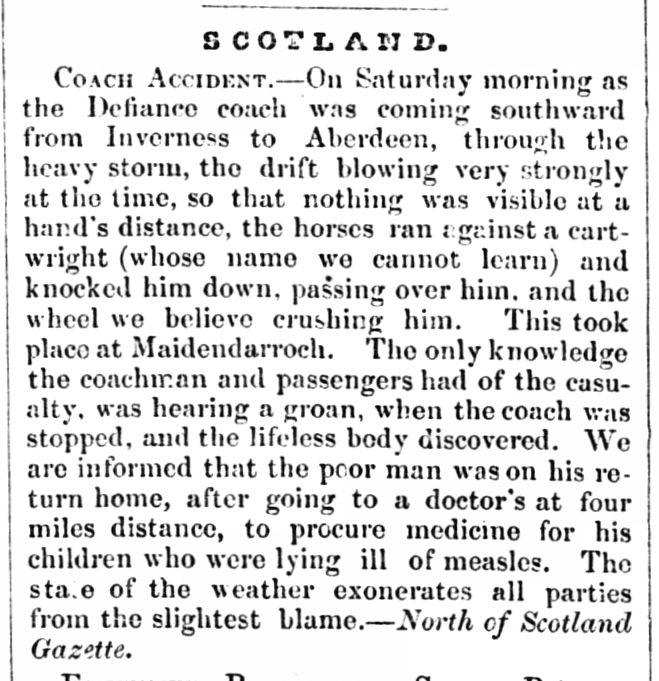
“Coach Accident”
Nairnshire Mirror – 4 April 1846 – page 2c
British Newspaper Archive (www.findmypast.co.uk)
We can but imagine the news being reported to a distraught Elspeth and her young children. A silver lining of sorts was that all three girls survived the measles. Was it due to the medicine their father was carrying? A prompt investigation into the circumstances (especially by today’s standards) was conducted and rightly no blame was allocated to the coachman given the horrendous weather conditions.
A very brief entry was made into the Old Parish Records for Fyvie Parish. It records Robert’s burial four days later in the Kirkyard at Fyvie. The words in parenthesis “(killed by the coach)” were added to the entry.

National Records of Scotland – www.scotlandspeople.gov.uk
Robert was recorded as being 34 years of age when he died that day in Fyvie. Three months later Elspeth gave birth to a son, also named Robert – a son after three daughters. Sadly Robert never had the opportunity to hold his son. Elspeth remained at Meadaple for the rest of her life and it seems, without the safeguards we take for granted today, suffered great poverty and hardship for the rest of her life.
Robert’s brother William, four years his senior, appears to have been determined to have his brother’s memory recognised. A headstone was erected in Fyvie Kirkyard with the following inscription.
Erected by William Reid in memory of his brother Robert Reid
who resided at the Burnside of Meadaple & who at the age of 34 years
was by an unfortunate coach accident deprived of life near Meikle Folla 20 Mar. 1846.
A few years ago I was able to visit Fyvie Churchyard, accompanied by my wife Julie and daughter Emma, Robert’s 5 x great-granddaughter. We found the headstone in no time. Unlike many headstones of that era, its inscription is still very clear and is easily read. It sits next to a small memorial stone for his daughter Ann Reid, my 3 x great-grandmother, who died in 1872 at Meadaple only 32 years of age!!!.
The inscription records the tragic circumstances of Robert’s death, describing it as an “unfortunate coach accident”. However, it is reassuring to have researched his story and know the full circumstances of his accidental death and his dash, in the worst of weather, to get vital medicine to save his three little girls. Indeed without that dash, my daughter and I may not be here today.
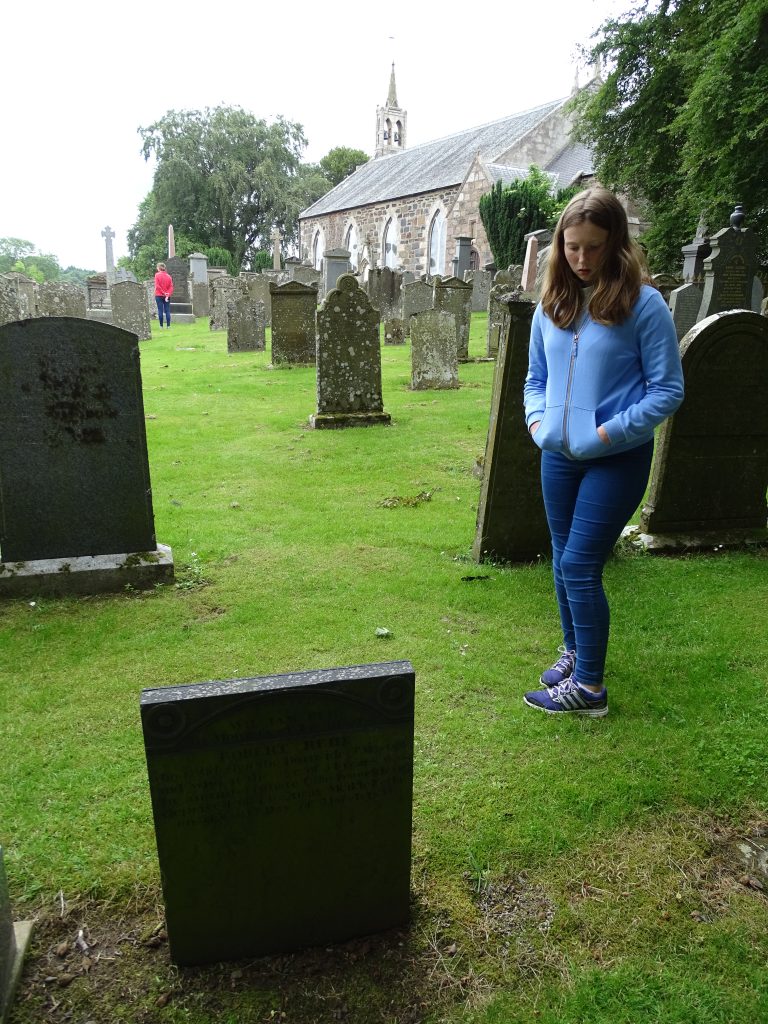
Personal Photograph
- Births & Baptisms Index (OPR) Scotland. Drumblade, Aberdeenshire, Scotland, Aberdeenshire, Scotland. 23 April 1813. REID, Robert. 188/00. 010. 189. Collection: NRS, OPR Births & Baptisms. https://www.scotlandspeople.gov.uk
- Births & Baptisms Transcription (OPR) Scotland. Daviot, Aberdeenshire. 25 November 1816. TAYLOR, Elspet. 187/00. 001. Collection: Scotland, Parish Births & Baptisms 1564-1929 Transcription. http://www.findmypast.co.uk
- Marriages Transcription (OPR) Scotland. Daviot, Aberdeenshire. 13 January 1839. REID, Robert & TAYLOR, Elspet. 187/00. 02. 096. Collection: Scotland, Parish Marriages & Banns 1561-1893 Transcription. https://www.findmypast.co.uk
- MacPherson, Herbert T. 1936. Macpherson’s improved map of Aberdeen, Banff and Deeside, &c. Map.s.41.26. Dunfermline. National Library of Scotland. https://maps.nls.uk/counties/rec/7347
- Census Scotland. Fyvie, Aberdeenshire. 197/00. http://www.scotlandspeople.gov.uk. 1841. REED, Robert (27); Burnside of Meadaple; 197/00. 005. 005. National Records of Scotland. https://www.scotlandspeople.gov.uk.
- Ordnance Survey. OS Maps, Six-inch, 1st Edition, Scotland, England & Wales, 1843 – 1882. National Library of Scotland. https://maps.nls.uk/os/6inch/
- Newspaper Article. Scotland. 1846. Aberdeen Herald. 4 Jul 1846. Coaching In The North – The Defiance. p107d. www.findmypast.co.uk
- Newspaper Article. Scotland. Aberdeen Herald. Advert – Defiance Coach Service – Aberdeen to Inverness. 28 October 1848. p1a. British Newspaper Archive. http://www.findmypast.co.uk
- Newspaper Article. Scotland. 1846. Nairnshire Mirror. Coach Accident. 4 Apr 1846. p2c. British Newspaper Archive. https://www.findmypast.co.uk
- Newspaper Article. Scotland. 1846. Aberdeen Journal. Coach Accident. 25 March 1846. p3d. British Newspaper Archive. https://www.findmypast.co.uk
- Deaths & Burial Records (OPR) Scotland. Fyvie, Aberdeenshire. 1846. REID, Robert. 197/00. 194. Collection: NRS, OPR Deaths & Burials. http://www.scotlandspeople.gov.uk

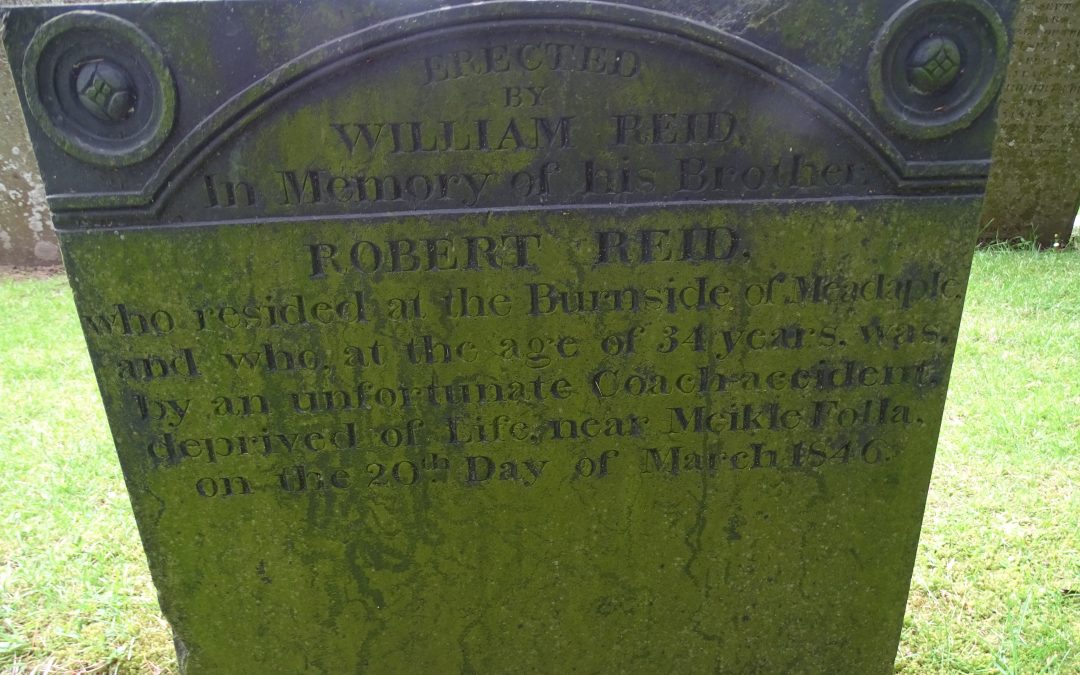
Recent Comments